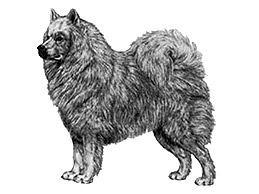Samoyed
Last updated: 21 May 2009
A breed standard is the guideline which describes the ideal characteristics, temperament, and appearance of a breed and ensures that the breed is fit for function with soundness essential. Breeders and judges should at all times be mindful of features which could be detrimental in any way to the health, welfare or soundness of this breed.

Pre 1987 Kennel Club, London
-
Group:
Group 6 (Utility)
-
History:
-
General Appearance:
The Samoyed being essentially a working dog should be strong and active and graceful, and as his work lies in cold climates his coat should be heavy and weather-resisting. He should not be too long in back, as a weak back would make him practically useless for his legitimate work; but at the same time a cobby body, such as a Chow's would also place him at a great disadvantage as a draught dog. Breeders should aim for the happy medium, viz. a body not long, but muscular, allowing liberty, with a deep chest and well sprung ribs, strong neck proudly arched, straight front and exceptionally strong loins. Both dogs and bitches should give the appearance of being capable of great endurance but should be free from coarseness. A full grown dog should stand about 53.5 cm (21 ins.) at the shoulder. On account of the depth of chest required the legs should be moderately long, a very short-legged dog is to be deprecated. Hindquarters should be particularly well developed, stifles well angulated, and any suggestion of unsound stifles or cowhocks severely penalised.
-
Characteristics:
The Samoyed is intelligent, alert, full of action but above all displaying affection towards all mankind.
-
Temperament:
(See under Characteristics.)
-
Head And Skull:
Head powerful and wedge-shaped with a broad, flat skull, muzzle of medium length, a tapering foreface not too sharply defined. Lips black. Hair short and smooth before the ears. Nose black for preference, but may be brown or flesh-coloured. Strong jaws.
-
Eyes:
Almond shaped, medium to dark brown in colour, set well apart with alert and intelligent expression. Eyerims should be black and unbroken.
-
Ears:
Thick, not too long and slightly rounded at the tips, set well apart and well covered inside with hair. The ears should be fully erect in the grown dog.
-
Mouth:
Upper teeth should just overlap the underteeth in a scissor bite.
-
Neck:
-
Forequarters:
Legs straight and muscular with good bone.
-
Body:
Back medium in length, broad and very muscular. Chest broad and deep ribs well sprung, giving plenty of heart and lung room.
-
Hindquarters:
Very muscular, stifles well angulated; cow hocks or straight stifles very objectionable.
-
Feet:
Long, flattish and slightly spread out. Soles well cushioned with hair.
-
Tail:
Long and profuse, carried over the back when alert; sometimes dropped when at rest.
-
Gait/Movement:
Should move freely with a strong agile drive showing power and elegance.
-
Coat:
The body should be well covered with a thick, close, soft and short undercoat, with harsh hair growing through it, forming the outer coat, which should stand straight away from the body and be free from curl.
-
Colour:
Pure white; white and biscuit; cream.
-
Sizes:
Dogs 51-56 cms (20-22 ins) at the shoulder.
Bitches: 46-51 cms (18-20 ins) at the shoulder.
Weight in proportion to size.
-
Faults:
Any departure from the foregoing points should be considered a fault and the seriousness with which the fault should be regarded should be in exact proportion to its degree and its effect upon the health and welfare of the dog.
Severe unprovoked aggressiveness.
Long foreface.
Blue or very light eyes.
Big ears with very little feathering.
Drop ears; narrow width between ears.
A bull neck. A long body.
Slack tail carriage; it should be carried well over the back, though it may drop when the dog is at rest.
Round, cat-like feet.
A soft coat; a wavy coat; absence of undercoat.
Absence of Feathering.
Black or black spots.
Any sign of unsound movement.
-
Notes:
Male animals should have two apparently normal testicles fully descended into the scrotum.
 For owners
For owners
 Members
Members
 Dogs Australia is a not-for-profit organisation advocating for the preservation of purebred dogs through ethical breeding.
It champions the highest standard of animal welfare through education and fostering dog-loving communities.
Internationally recognised and established in 1958 as the Australian National Kennel Council (ANKC),
the organisation promotes responsible dog ownership; maintains the ORCHID* heritable canine diseases database;
funds research into canine diseases; and supports state and territory-based member bodies.
Dogs Australia promotes breed conformation shows and community sports for dogs that fulfil a breed’s natural instincts.
Dogs Australia is a not-for-profit organisation advocating for the preservation of purebred dogs through ethical breeding.
It champions the highest standard of animal welfare through education and fostering dog-loving communities.
Internationally recognised and established in 1958 as the Australian National Kennel Council (ANKC),
the organisation promotes responsible dog ownership; maintains the ORCHID* heritable canine diseases database;
funds research into canine diseases; and supports state and territory-based member bodies.
Dogs Australia promotes breed conformation shows and community sports for dogs that fulfil a breed’s natural instincts.







